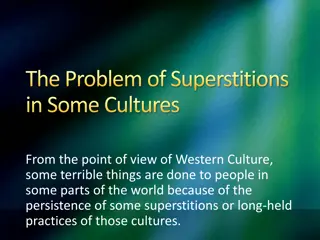Unveiling Greek Superstitions: Evil Eye, Walking Sign, and Social Context
Greek superstitions are deeply ingrained in the culture, passed down through generations and encompassing beliefs in the Evil Eye and walking sign. The Evil Eye superstition involves protection charms and rituals against malevolent glares, while the walking sign dictates consequences for crossing legs or doors. These practices reflect a blend of magic and societal perceptions, rooted in explanations for misfortune and illness within Greek society.
Download Presentation

Please find below an Image/Link to download the presentation.
The content on the website is provided AS IS for your information and personal use only. It may not be sold, licensed, or shared on other websites without obtaining consent from the author.If you encounter any issues during the download, it is possible that the publisher has removed the file from their server.
You are allowed to download the files provided on this website for personal or commercial use, subject to the condition that they are used lawfully. All files are the property of their respective owners.
The content on the website is provided AS IS for your information and personal use only. It may not be sold, licensed, or shared on other websites without obtaining consent from the author.
E N D
Presentation Transcript
Greek Superstitions Carmen Braceras, Katie Spanos, Jessica Valvano, Ellen Pattinson
Introduction Greek Culture: Superstitions are extremely popular across Greek culture They are usually passed down from grandparents and parents Some of them are strictly Greek superstitions, others are observed in other cultures too Superstitions: Sign Superstitions: If A, then B Magic Superstitions: If you do A, then B Conversion Superstitions: If A, then B, unless C
Evil Eye Sign Superstitions: If someone looks at you the wrong way, then you will have the evil eye and may begin to feel ill, act strange, cry, or feel pain Informants: Billy Kosmidis, David Lilla, Vungelia Glyptis, Judith Varlamos, Mary Wallenmeyer, Lia Constantine If oil mixes in a cup of water, then the person of question is okay, but if the oil spreads then the person is affected by the evil eye. Informant: Billy Kosmidis Magic Superstitions: If you wear a special charm ( philacto ), you will be protected from the evil eye Informants: Judith Varlamos, Mary Wallenmeyer, Lia Constantine If a trained person says prayers over clothing of the affected, then they will be cured (CONTAGIOUS MAGIC) Informants: Mary Wallenmeyer
Social Context: Can be given accidentally or on purpose by strangers or bad people to anyone People often aren t aware of receiving the evil eye Charms commonly worn and given to newborn babies Processes to identify or cure the evil eye are performed in the home by specially trained individuals Superstition is passed down from parents Cultural Context: Recognized by the church as a legitimate religious phenomena Evil generated by the devil Serves as an explanation for bad things that occur-- esp. illnesses or pain
Walking Sign Superstition (If A, then B) If you walk across someone s legs, bad things will happen Informants: Ally Stone and George Spanos Magic Superstition (If you do A, then B): If you don t walk out of the same door that you entered in, your life will not keep flowing correctly and the single people at the party will never get married Informants: Vungelia Glyptis, Mary Wallenmeyer, George Spanos
Social Context: Practiced during events and gatherings (church, weddings, family dinners, etc.) Passed down through families Anytime a person enters or exits a building Cultural Context: Walking out the same door you entered symbolizes ending or closing the event and not leaving it undone. This is especially important in church gatherings or big family meals.
Pregnancy Sign Superstition (If A, then B): (Needle hung from string over pregnant woman s hand)-- If the needle settles into circular motion then baby is a girl. If it swings back and forth, then baby is a boy. Informants: Mary Wallenmeyer, Katie Spanos Magic Superstitions (If you do A, then B): If a mother eats/touches/interacts with anything red during a certain week of her pregnancy, then her child will have a birth mark. Informant: Vungelia Glyptis If you eat pomegranates, you will be more fertile Informant: Katie Spanos
Social Context: Needle: extended family will practice this on pregnant woman to guess baby s gender Red: something familiy members will remind pregnant woman about Pomegranate superstition: passed from adult female figures to younger women Pomegranates given to girls and young women by older women to bring them fertility Cultural Context: Needle during pregnancy was used before ultrasounds existed, now more of a fun way to predict gender of baby Red: color is associated with the devil Pomegranate has mythological ties to Persephone and Demeter (Greek goddess of fertility and harvest)
New Years Celebrations Sign Superstitions: If you receive the piece of Vasilopita cake that has a coin in it on New Year s Day, you will have good luck all year Informants: Katie Spanos and Lia Constantine When you throw a pomegranate on the ground on New Year s Eve, if it has a lot of seeds, you will have good luck Informant: Vungelia Glyptis
Social Context: Both are a gathering of family and friends to celebrate good luck to start the New Year Often done in church the Sunday before New Year s among all of the Parishioners First 3 pieces of Vasilopita cake are given to St. Basil, Jesus, and the Virgin Mary; then, the pieces are distributed oldest to youngest Cultural Context: Vasilopita- Thieves took valuables from people. St. Basil became responsible for returning the riches to people but didn t know how to give them out. Fair way to distribute them was for women to bake cake with valuables inside and distribute pieces of the cake. Pomegranate- Symbol of prosperity, often hung above the door around christmas until it is broken on New Years
Conclusion Overall Trends Older generations believed more strongly in the superstitions, while the younger informants often practiced them for fun but do not value them in the same way We interviewed people of different backgrounds and their only connection was coming from a Greek family. It was interesting to see how many followed the same superstitions such as the Evil Eye. Some of the superstitions focused on good and bad luck, but others had very specific consequences/purposes not relating to luck.
Thank you! Questions?























